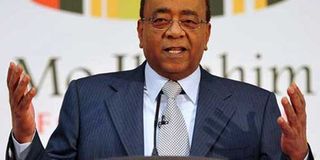AU urged to help end conflicts in Burundi, South Sudan

Mr Mo Ibrahim, founder of the Mo Ibrahim Foundation. AFP PHOTO | CARL COURT
What you need to know:
- The AU will hold the 26th Ordinary Session of the AU general Assembly for heads of State and government this Saturday.
- South Sudanese leaders have failed to agree on a transitional government as stated in a peace agreement signed last August.
The Founder of the Mo Ibrahim Foundation, five other entrepreneurs and human rights campaigners have written to the African Union to use upcoming summit to sort out conflicts in South Sudan and Burundi, as a matter of urgency.
In an open letter to the African Union, the Sudanese-British philanthropist and his colleagues said the meeting starting on January 30 should be “both opportunity and a responsibility to respond to these crises.”
“This is a grave test of AU credibility, and of the continent’s ability to solve its own problems,” they wrote on Wednesday.
“Failure to act now would dent the reputation of the institution and those at its helm, and constitute a betrayal of the ordinary civilians in both countries whose lives are gravely affected by continuing violence and a lack of accountability.”
The AU will hold the 26th Ordinary Session of the AU general Assembly for heads of State and government this Saturday under the theme “2016: African Year of Human Rights with a particular focus on the Rights of Women.”
But it comes amid rising tensions in Burundi where about 400 people have been killed and 230,000 displaced in a conflict following President Pierre Nkurunziza’s bid for third term.
It also comes at a time when South Sudanese leaders have failed to agree on a transitional government as stated in a peace agreement signed last August.
President Salva Kiir and his former Vice President Riek Machar have disagreed over the 28 new states Kiir created last December.
As is tradition, a report on the crises in Africa prepared by the Peace and Security Council, AU’s top organ charged with security matters, will be tabled before the leaders during the AU’s 26th Ordinary Summit.
TROOPS
On Wednesday, the entrepreneurs said: “The people of Africa and the world are watching closely. We urge you to fulfill their trust, and act in the interests of the continent, the institution that you serve, and of your fellow Africans.”
This is the first time Mr Mo Ibrahim, the founder of the Mo Ibrahim Foundation which publishes annual governance rankings of African countries, is calling on the AU to make a move on the crises.
The letter publicised on Wednesday was also signed by South African, Mr Jay Naidoo, who chairs the Board of and the Partnership Council of the Global Alliance for Improved Nutrition (GAIN) and Uganda’s Victor Ochen, the Director of African Youth Initiative Network and 2015 Nobel Peace Prize nominee.
Others are Dr Chidi Odinkalu, the Chair of the Governing Council of Nigeria’s National Human Rights Commission, Ms Navi Pillay South Africa’s former Rwanda Tribunal (ICTR) judge and UN High Commissioner for Human Rights and Mr Ashish J Thakkar, founder of the Mara Group.
The group charged that despite various pronouncements by the AU on the two countries, the implementation has been slow, leading to more human suffering.
In Burundi, the AU Peace and Security Council endorsed the deployment of 5,000 troops to protect civilians back in December.
But Bujumbura rejected the decision calling the troops an invasion force. The AU has spent most of January trying to convince Burundi to allow the peacekeeping forces.
In South Sudan, the campaigners argued there has been no hybrid court to prosecute violence perpetrators, four months after the peace agreement was signed.
“It is critical that the AU’s decisions on Burundi and South Sudan are implemented immediately, in order to fulfill our collective commitment to prevent crimes against humanity and assist those at risk of grave harm.
“Vested interests and political allegiances cannot be allowed to prevail,” they said.
They called on the AU to use “all diplomatic means and political leverage” to convince Burundi to allow the troops in.





